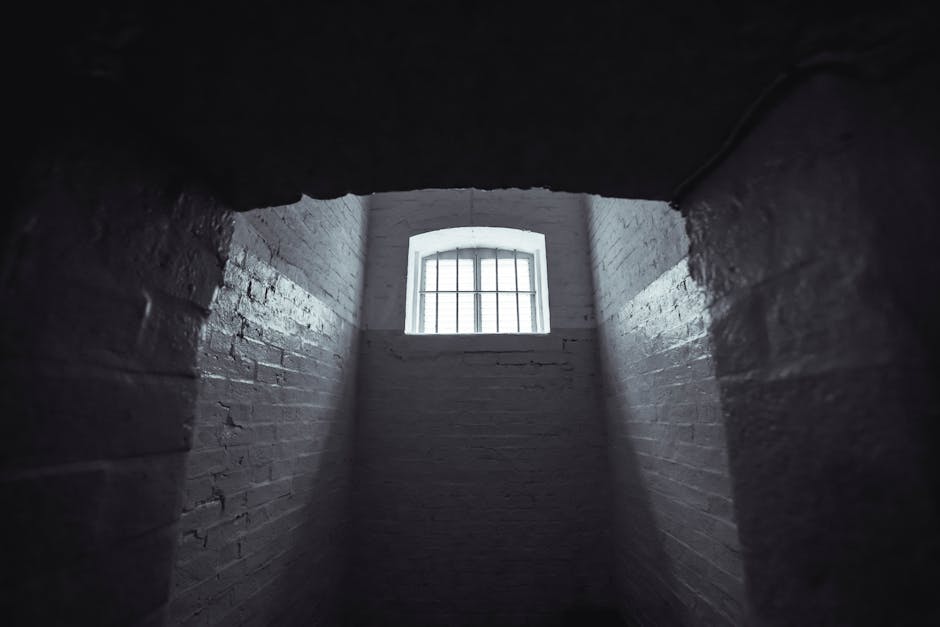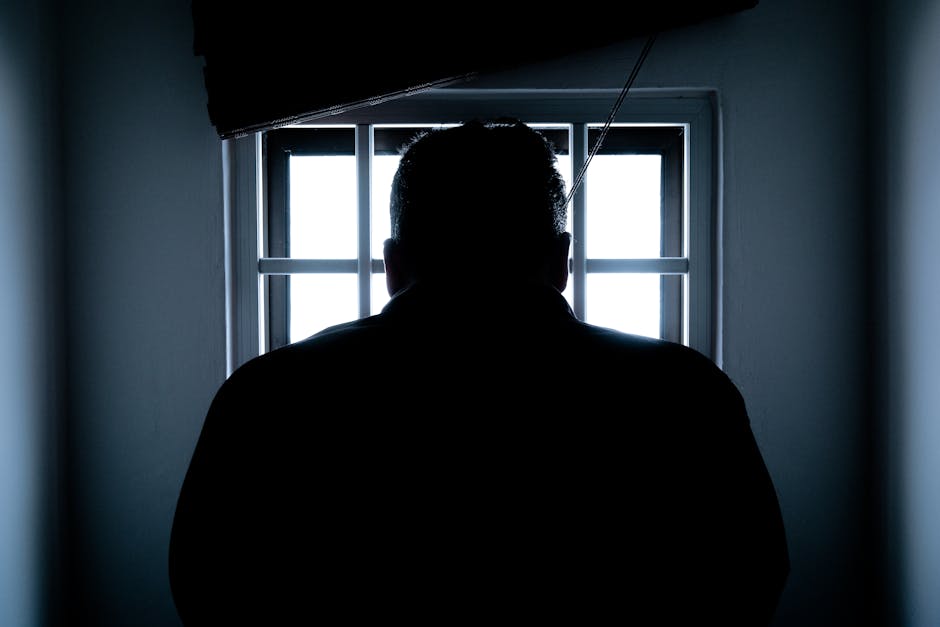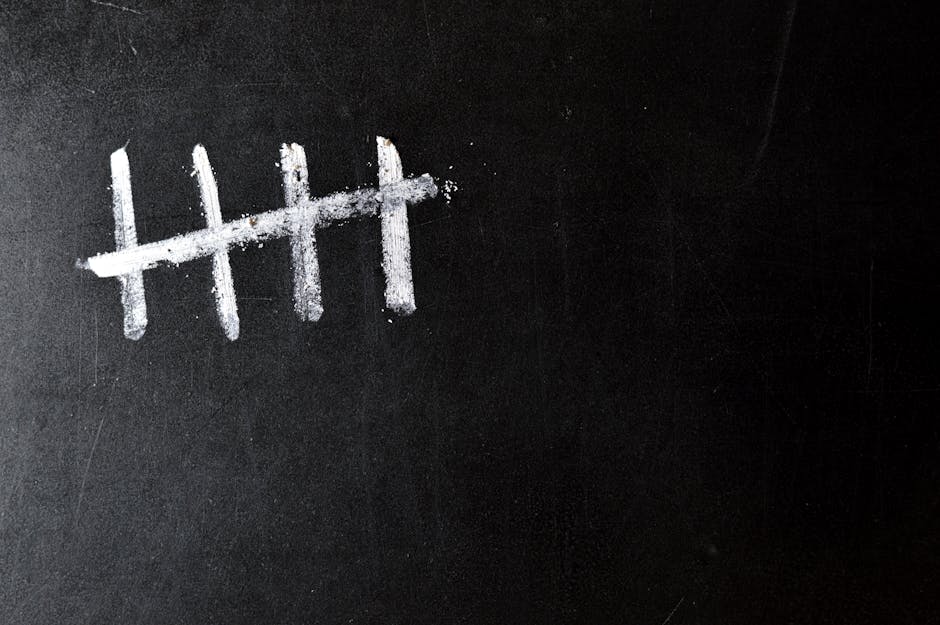Poems about prison offer a haunting glimpse into the lives of those trapped behind bars. These verses explore the complex emotions and harsh realities of incarceration, offering a unique perspective on one of society’s most pressing issues. Through rhythmic words and powerful imagery, poets delve into the shared experiences of isolation, desperation, and the yearning for freedom.
Each poem paints a different picture of prison life, capturing the raw emotions of both inmates and guards. Some poems focus on the oppressive atmosphere and strict routines, while others capture intimate moments of human connection and resilience. These verses explore the psychological and emotional impact of confinement, shedding light on the lives of individuals caught in the criminal justice system.
Through poems about prison, we gain a deeper understanding of the human condition in the face of adversity. These poems challenge us to confront the complexities of mass incarceration and the urgent need for social reform.
25 Haunting Poems about Prison
Behind Bars
Silent screams in the dead of night
Echoes of freedom’s distant light
Concrete walls that suffocate
A life of confinement, an endless fate
The Iron Cage
Rusty hinges creak with every move
Heavy chains that bind, a soul to groove
In this cold, dark, hopeless place
A heart beats slow, a spirit’s space
Forgotten Dreams
Shadows dance upon the wall
Whispers of a life that once stood tall
Memories of love, of laughter and of tears
Now nothing but the stench of all our fears
Stone Cold
Grey walls closing in, it’s hard to breathe
A world outside, where life and love do seethe
But in this cell, I’m lost and alone
A prisoner of my own, heart of stone
The Unseen
In the darkness, I search for the light
A glimmer of hope, a guiding sight
But it’s hard to find, in this endless night
When the only sound, is the echo of my plight
The Last Goodbye
Farewell, dear friend, it’s hard to let go
Memories of laughter, now only tears do flow
In this cold, harsh place, I’m left to grieve
A life cut short, a future to retrieve
Invisible Chains
Heavy links that bind, a soul so bright
A life confined, in the dark of night
The sound of keys, a distant hum
A freedom lost, a life undone
Whispers in the Dark
Echoes of the past, that still remain
Whispers of a love, that could not sustain
In this cold, dark place, I’m left to decay
A heart that’s lost, a soul that’s gray
Fractured Lives
Pieces of a life, that once was whole
Shattered dreams, a broken soul
The sound of silence, it’s hard to bear
A life confined, with no escape to share
A Life Unlived
A future unfulfilled, a promise unkept
A life of what-ifs, a heart that’s slept
In this cold, dark place, I’m left to roam
A soul that’s lost, a life that’s unknown
Shadows on the Wall
Dark silhouettes, that dance and play
Echoes of a life, that’s gone astray
Memories of love, of laughter and of tears
Now nothing but the stench of all our fears
Beyond the Bars
A world outside, where love does grow
A life of freedom, where hearts do glow
But in this cell, I’m trapped and confined
A prisoner of my own, heart and mind
Enjoying these poems? You can also create your own poems with our Advanced AI Poem Generator.
The Iron Bars of Solace
Behind these iron bars I’ve found a home
A place where time stands still, and I am alone
The screams and laughter of the world outside
Are muffled voices, distant and denied
In this cold, dark cell, I’ve learned to reside
A prisoner of my thoughts, I’ve lost my pride
Behind Bars
Concrete walls surround me, cold and grey
A life of solitude, where hope drifts away
The sound of keys clinking, a jarring tone
Echoes of freedom, now but a distant throne
I pace back and forth, in a worn-out space
Trying to escape the meaninglessness of this place
But the bars, they mock me, a constant reminder too
That I am trapped, with nothing left to do
But the memories of past, and dreams of the future
Fading away, like the light of a distant burner
The Weight of Chains
Heavy chains confine me, a weight on my soul
A burden I carry, with each heavy roll
The sound of voices, echoes in my mind
A constant reminder, of the life left behind
I strain to breathe, as the air grows thin
The scent of iron, invading my skin
I wonder how, I ended up in this place
With shackles binding me, a distant light in a space
The weight of chains, suffocating me slow
As I lose all hope, in this dark and endless woe
The Long Walk
I walk along the creaking floorboards late
The echoes of my footsteps, my only fate
I walk and walk, in search of a way out
But the doors are locked, and the keys without
I walk through corridors, that seem to never end
Past cells and cells, where lives are imprisoned within
The weight of despair, crushing me slow
As I search for a glimmer, of hope that may grow
But it’s a mirage, a fleeting thought
As I’m forced to continue, on this endless route
The Cells of the Mind
Bars surround my thoughts, a mental prison so cold
A place where fears and doubts, forever unfold
The sound of whispers, a constant eerie noise
A reminder that freedom, is but a distant joys
I try to escape, but the walls are too strong
A labyrinth of thoughts, that never seem to be wrong
I’m trapped in a maze, of my own making
Where fear and anxiety, are forever invading
Iron Bars and Echoes
Behind these bars, my spirit cries,
Echoing through the cold, dark skies.
I long for freedom, I yearn for light,
Yet here I am, in perpetual night.
The walls around me, grey and bleak,
Hold secrets that no one will seek.
I am but a number, not a name,
In this place where all hope is tame.
I hear the clang of keys at dawn,
A reminder of this life I’ve drawn.
No sun upon my face, no wind in my hair,
Just an endless, lifeless stare.
Yet still, I dream of open fields,
Of love and laughter- none of these deals.
One day, perhaps, I’ll see the skies,
Far from these iron bars and echoes rise.
Stolen Time
Time marches on, without a beat,
Inside these walls, it’s incomplete.
Minutes stretch to hours so slow,
Behind these bricks, time ebbs and flows.
Days blend into weeks and years,
Stripped of meaning, stripped of cheers.
Seasons pass, their colors fade,
In the confines of this ill-made cage.
I look back at time before,
At moments missed, at what I wore.
Now, here I stand, in silence, still,
Watching the clock, my only thrill.
Yet, within these stifled breaths,
I find solace in stolen rests.
Every second seized and claimed,
An act of rebellion – life unchained.
Chains and Shadows
Chains clink with each reluctant step,
A haunting rhythm to this fate’s rep.
Shadows creep along these cold stone halls,
Whispering stories, echoing calls.
These chains, they bind my body tight,
Stealing movement, snatching light.
But the true lock, the hidden key,
Is imprisoned deep within me.
The shadows dance on the walls, taunting me,
Recalling tales of lives gone eerily.
Ghosts of yesterday’s screams resound,
Lost souls, no peace has been found.
In chains and shadows, I find a strange song,
A melody of existence, moving along.
The rhythm of my heart, slow yet steady,
A silent protest against this unfair readiness.
Walls of Solitude
These stone walls hold tales of solitude,
Echoing whispers in silent seclusion.
Every brick, a promise left unbroken,
Words like promises, forsaken.
Within these four corners, I am confined,
A captive creature of sorrow and grind.
Wandering thoughts are all I own,
Lost in the vastness, here, alone.
The wind outside sings of freedom’s call,
Mocking the silent wall I must installation.
Through tiny cracks, I see life beyond,
A world unfamiliar, it moves along.
The echo of my heartbeat fills the void,
An orchestra of isolation with a single chord.
In the symphony of solitude, I embrace the sonnet,
Of loneliness, the only companion within this fortress forgotten.
Most Popular Poems About Life Behind Bars
“The Convict’s Return” by Henry Wadsworth Longfellow
This poem tells the story of a prisoner’s homecoming, where he is met with a mix of emotions from his loved ones. Longfellow explores the complexities of guilt, shame, and redemption as the convict struggles to reintegrate into society. The poem delves into the psychological effects of imprisonment, highlighting the difficulties of readjusting to freedom.
“The Prisoner” by Emily Dickinson
In this enigmatic poem, Dickinson explores the inner world of a prisoner, where time loses all meaning. The speaker reflects on the monotony of incarceration, where days blend together in an endless cycle of drudgery. Dickinson’s characteristic imagery and symbolism create a sense of claustrophobia, underscoring the psychological impact of confinement.
“Fugitive Slave’s Apostrophe to the North Star” by William Wells Brown
This powerful poem gives voice to a slave’s desperate plea for freedom, as he escapes from his captors and looks to the North Star for guidance. Brown’s poem is a testament to the resilience of the human spirit, as the speaker finds solace in the natural world and the promise of a better life.
“I Know Why the Caged Bird Sings” by Maya Angelou
This iconic poem is a poignant exploration of the longing for freedom and the struggle for self-expression. Angelou’s vivid imagery and soaring rhetoric capture the essence of the human desire for liberation, as the caged bird sings of its dreams and yearnings.
“The Ballad of Reading Gaol” by Oscar Wilde
Wilde’s poem is a haunting account of his own imprisonment, where he reflects on the harsh realities of life behind bars. The poem explores the themes of isolation, despair, and redemption, as Wilde grapples with the consequences of his own actions.
“In Prison” by Floyd Dell
This modernist poem is a stream-of-consciousness exploration of the prison experience, where the speaker’s thoughts tumble forth in a chaotic, disjointed narrative. Dell’s experimental style captures the disorienting effects of incarceration, where time and space lose all meaning.
“Prison” by Langston Hughes
Hughes’ poem is a stark portrayal of the brutal realities of prison life, where hopelessness and despair reign supreme. The speaker’s voice is a testament to the resilience of the human spirit, as he finds solace in the rhythms of jazz and the promise of a better tomorrow.
“To a Solitary” by John Cowper Powys
In this haunting poem, Powys explores the psychological effects of solitary confinement, where the prisoner’s mind begins to unravel. The poem delves into the darkest recesses of the human psyche, where madness and despair lurk, and the boundaries between reality and fantasy blur.
“Prisoner” by Nazim Hikmet
Hikmet’s poem is a searing indictment of the prison system, where political dissidents are silenced and broken. The speaker’s voice is a cry of defiance, as he refuses to be crushed by the oppressive regime, and finds solace in the power of poetry and resistance.
“Incarcerated” by Claudia Rankine
This contemporary poem is a nuanced exploration of the Black experience in America, where incarceration is a constant threat. Rankine’s lyrical prose captures the sense of dislocation and disorientation, as the speaker navigates the labyrinthine corridors of the prison system.
The Power of Poetry: Examining Poems About Prison
Poetry has long been a powerful tool for exploring the human experience, shedding light on the darkest corners of the soul, and giving voice to the voiceless. Poems about prison are no exception. These works offer a unique perspective on the prison system and the people it affects, from inmates to guards to family members. Through vivid imagery and emotional language, these poems challenge readers to confront their own biases and consider the complexities of incarceration.
The Prison Experience: A Common Theme
At its core, the prison experience is one of confinement and isolation. Poems about prison often explore this theme, describing the physical and emotional toll of being locked away from the world. These works may depict the stark, cold reality of prison life, with its concrete walls, metal bars, and harsh fluorescent lighting. They may also delve into the psychological impact of incarceration, exploring feelings of loneliness, hopelessness, and despair.
The Humanity of Inmates: Breaking Down Stereotypes
One of the most powerful aspects of poems about prison is their ability to challenge stereotypes and humanize inmates. These works often depict prisoners as complex individuals with rich inner lives, rather than one-dimensional criminals. They may explore the backstories of inmates, shedding light on the circumstances that led them to prison. They may also highlight the ways in which prisoners maintain their dignity and humanity in the face of adversity.
The Role of Guards: Exploring Power Dynamics
Poems about prison often explore the power dynamics between inmates and guards. These works may describe the ways in which guards exert control over prisoners, both physically and psychologically. They may also delve into the emotional toll of this power dynamic, examining the ways in which guards are affected by their roles. These poems may challenge readers to consider the ethical implications of incarceration and the responsibility of those who work within the prison system.
The Impact on Families: A Often Overlooked Aspect
In addition to exploring the experiences of inmates and guards, poems about prison may also examine the impact of incarceration on families. These works may describe the pain of separation, the financial strain of having a loved one in prison, and the stigma that often accompanies imprisonment. They may also highlight the ways in which families maintain their relationships and support systems in the face of adversity.
The Potential for Redemption: A Message of Hope
While many poems about prison focus on the challenges and hardships of incarceration, others offer a message of hope. These works may explore the potential for redemption and rehabilitation, describing the ways in which prisoners can learn from their mistakes and grow as individuals. They may highlight the power of education, therapy, and other rehabilitative programs to transform the lives of inmates.
The Role of Poetry: A Tool for Change
At their best, poems about prison can serve as a tool for change. These works can challenge readers to confront their own biases and consider the complexities of incarceration. They can also provide a platform for prisoners and their families to share their stories and advocate for reform. Through their emotional power and vivid imagery, poems about prison can inspire readers to take action and work towards a more just and equitable society.
In conclusion, poems about prison offer a powerful exploration of the prison system and the people it affects. These works challenge readers to confront their own biases, humanize inmates, explore power dynamics, examine the impact on families, and offer a message of hope. Through their emotional power and vivid imagery, these poems can inspire readers to take action and work towards a more just and equitable society.



